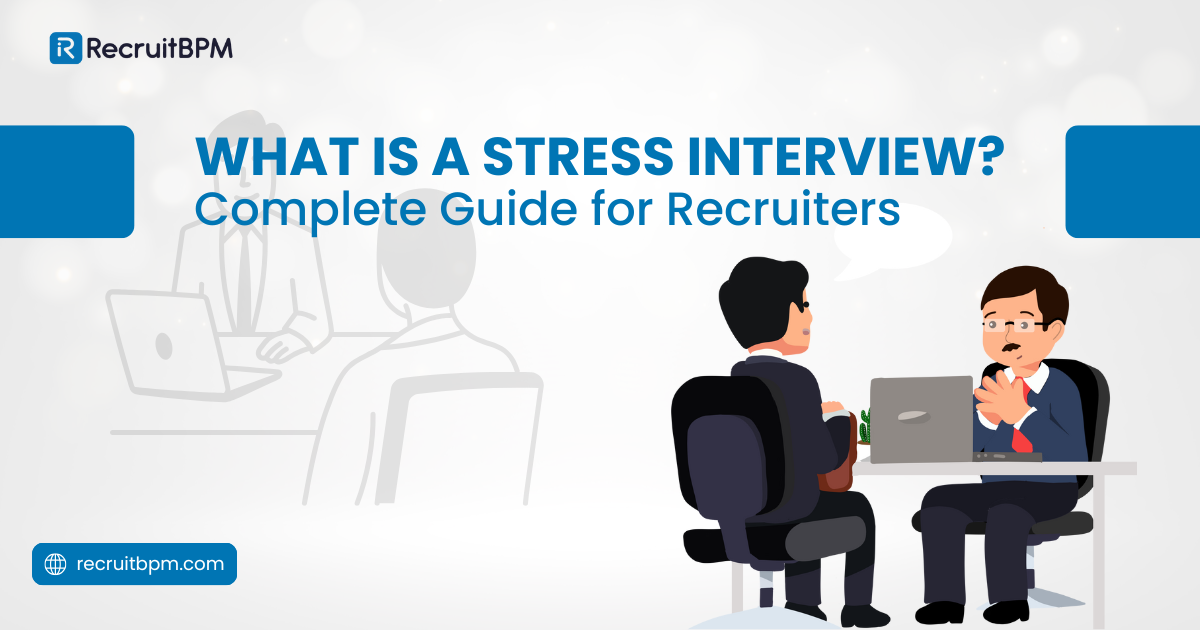High-pressure roles require candidates who perform under stress. Stress interviews help recruiters evaluate composure, problem-solving abilities, and emotional intelligence in challenging situations. Understanding this assessment technique helps staffing firms identify candidates thriving in demanding environments.
This specialized interviewing approach creates intentional pressure. Recruiters observe real-time reactions rather than relying on self-reported capabilities.
Understanding Stress Interviews
What Stress Interviews Mean for Recruiters?
A stress interview is a specialized recruitment method where interviewers intentionally create high-pressure environments. Recruiters assess candidates’ ability to handle pressure, uncertainty, and difficult situations through this technique.
Unlike traditional interviews focusing on skills and experience, stress interviews evaluate emotional intelligence. Composure under duress reveals characteristics standard questioning cannot uncover. Problem-solving abilities surface when candidates face unexpected challenges.
Staffing agencies use stress interviews for specific client roles. Customer-facing positions, leadership roles, and crisis management positions benefit from this assessment approach. These environments demand professionals to maintain effectiveness despite constant pressure.
How Stress Interviews Differ from Traditional Interviews?
Traditional interviews prioritize technical qualifications and past experience. Candidates describe previous accomplishments in comfortable, supportive environments. Interviewers facilitate positive conversations, allowing candidates to showcase their strengths.
Stress interviews intentionally disrupt this comfort. Interviewers may interrupt responses, ask contradictory questions, or display dismissive behavior. These techniques test resilience rather than technical knowledge.
The goal shifts from understanding what candidates have done to observing how they handle adversity. Real-time reactions provide insights that self-reported stories cannot deliver.
Purpose of Stress Interview Techniques
Stress interviews serve multiple assessment purposes. First, they reveal genuine stress tolerance levels. Candidates claiming composure under pressure must demonstrate this capability directly.
Second, these interviews expose critical thinking under constraints. Time pressure and uncomfortable situations force rapid decision-making. The quality of those decisions predicts job performance accuracy.
Third, stress interviews assess emotional regulation. Candidates maintaining professionalism despite provocation show the maturity essential for client-facing roles. Those who become defensive or flustered may struggle similarly in actual job scenarios.
When Are Stress Interviews Most Effective?
Stress interviews work best for roles involving consistent high-pressure situations. Sales positions requiring difficult client negotiations benefit from this assessment. Management roles handling workplace conflicts need stress-resilient candidates.
Emergency response positions absolutely require stress testing. Healthcare professionals, law enforcement officers, and crisis managers face life-or-death pressure regularly. Traditional interviews cannot adequately assess these capabilities.
However, stress interviews prove inappropriate for many positions. Administrative roles, technical positions with minimal interpersonal demands, and creative roles rarely justify this approach. Misapplication damages candidate experience without providing valuable insights.
Types of Stress Interview Techniques
Rapid-Fire Questioning Methods
Rapid-fire questioning involves bombarding candidates with successive questions, allowing minimal response time. Interviewers interrupt answers, redirect topics abruptly, and maintain a relentless pace throughout conversations.
This technique tests mental agility and composure. Candidates must organize their thoughts quickly while processing multiple topics simultaneously. Strong candidates maintain coherent responses despite pressure.
Recruiters observe whether candidates become flustered or maintain clarity. Answer quality under time constraints predicts performance in fast-paced work environments.
Aggressive or Dismissive Behavior Approach
Some stress interviews employ deliberately aggressive or dismissive interviewer behavior. Interviewers may scroll through phones, check watches repeatedly, or provide minimal eye contact during responses.
Others use confrontational tactics. Challenging candidate statements directly, questioning credentials aggressively, or expressing skepticism about qualifications creates uncomfortable dynamics.
This approach reveals how candidates handle disrespect or disinterest. Professionals maintaining composure and professionalism despite poor treatment demonstrate valuable emotional regulation capabilities.
Contradictory Questions and Scenarios
Contradictory questioning involves asking candidates to explain positions, then challenging those explanations with opposite requirements. Interviewers might praise certain qualities initially, then criticize those same attributes moments later.
Example sequences include: “We need innovative thinkers,” followed immediately by “We actually prioritize following established procedures strictly.” These contradictions force candidates to navigate conflicting expectations.
This technique tests adaptability and logical reasoning. Strong candidates acknowledge contradictions gracefully and seek clarification rather than becoming defensive.
Role-Playing High-Pressure Situations
Role-playing stress interviews simulate actual workplace challenges. Candidates handle angry customer scenarios, negotiate difficult contracts, or manage crisis situations during interviews.
For sales positions, interviewers may play demanding clients threatening to cancel contracts. Customer service candidates might handle simulated complaint escalations. Management candidates could address role-played employee conflicts.
These scenarios provide the closest approximations to actual job pressures. Recruiter observations during role-plays strongly predict real-world performance.
Some stress interviews incorporate seemingly impossible questions. “How many basketballs fit inside this building?” or “Why are manhole covers round?” force creative thinking under pressure.
These questions lack obvious answers. Instead, they reveal problem-solving approaches and confidence in handling ambiguity. Strong candidates think aloud, ask clarifying questions, and demonstrate logical reasoning despite uncertainty.
Recruiters assess whether candidates freeze, guess randomly, or work through problems systematically.
Why Recruiters Use Stress Interviews?
Evaluating Resilience and Composure
Resilience represents the ability to remain composed and effective under pressure. This trait proves crucial for roles involving high-stress environments or critical decision-making.
Observing stress responses during interviews predicts job performance in similar scenarios. Candidates maintaining composure likely handle workplace pressures effectively. Those who become visibly stressed may struggle when roles intensify.
Staffing agencies assessing resilience help clients avoid costly hiring mistakes. Poor stress tolerance leads to burnout, turnover, and performance problems.
Assessing Emotional Intelligence
Emotional intelligence encompasses recognizing and managing emotions effectively. Stress interviews reveal emotional regulation capabilities that traditional questions cannot assess.
Candidates controlling reactions during provocative questioning demonstrate high emotional intelligence. Those who become defensive, angry, or withdrawn show concerning patterns.
Client-facing roles especially require strong emotional intelligence. Professionals managing difficult customers, navigating workplace conflicts, or leading teams need these capabilities.
Testing Real-Time Problem-Solving Abilities
High-pressure situations demand quick thinking and effective problem-solving. Stress interviews provide controlled settings for observing these skills in action.
Standard interviews allow candidates to prepare polished stories. Stress interviews force authentic, unscripted responses. This authenticity reveals true capabilities more accurately.
Recruiters see whether candidates think strategically or react emotionally when pressured. Problem-solving quality under stress predicts job performance reliability.
Identifying Leadership Potential Under Pressure
Leadership often involves managing stress and making tough decisions. Stress interviews reveal whether candidates possess the necessary qualities for leadership roles.
Strong leaders maintain clarity when situations become chaotic. They make decisions despite incomplete information. They stay calm while others panic.
Stress interview observations help identify candidates with genuine leadership potential versus those simply claiming leadership capabilities.
Industries and Roles Requiring Stress Interviews
High-Pressure Customer-Facing Positions
Customer service roles involving angry clients, unrealistic demands, and constant complaints benefit from stress assessment. Representatives must maintain professionalism despite verbal abuse.
Call center positions handling high call volumes require stress resilience. Technical support roles require troubleshooting urgent issues and need composure under pressure.
Staffing agencies placing customer-facing candidates should verify stress tolerance. Client satisfaction depends on representatives’ handling difficult interactions professionally.
Leadership and Management Roles
Managers face workplace conflicts, tight deadlines, and competing priorities constantly. Leadership positions require making decisions affecting multiple people under pressure.
Executive roles involve high-stakes negotiations, crisis management, and strategic decisions with significant consequences. These responsibilities demand exceptional stress management.
Stress interviews help identify candidates genuinely prepared for leadership pressures versus those overwhelmed by management responsibilities.
Sales and Business Development
Sales professionals handle rejection daily. They negotiate with difficult prospects. They work toward aggressive quotas, creating constant pressure.
Business development roles involve high-stakes client relationships. Contract negotiations, proposal presentations, and competitive situations demand composure.
Stress interviews reveal whether candidates maintain motivation despite rejection and perform effectively under quota pressure.
Emergency Services and Healthcare
Emergency medical technicians, nurses, and doctors face life-or-death situations regularly. Split-second decisions affect patient outcomes. Emotional composure proves absolutely essential.
These roles cannot afford to hire candidates who freeze under pressure. Stress interviews provide critical assessment data that traditional methods cannot capture.
Healthcare staffing agencies must verify stress tolerance before placing candidates in emergency environments.
Law Enforcement and Security
Police officers, security personnel, and corrections officers encounter dangerous, unpredictable situations. They must make critical decisions instantly while managing personal safety concerns.
These roles require extraordinary emotional regulation. Professionals must remain calm during confrontations, think clearly during emergencies, and maintain professionalism despite provocation.
Stress interviews help identify candidates possessing the necessary psychological characteristics for law enforcement success.
Conducting Effective Stress Interviews
Setting Clear Assessment Criteria
Before conducting stress interviews, define specific evaluation criteria. Determine which stress-related competencies matter most for specific roles.
Customer service positions might prioritize emotional regulation and patience. Leadership roles might emphasize decision-making under ambiguity. Sales positions might focus on resilience after rejection.
Clear criteria ensure consistent evaluation across candidates. Multiple interviewers assess identical characteristics using standardized frameworks.
Balancing Pressure with Professionalism
Effective stress interviews create pressure without crossing into harassment or discrimination. Interviewers must maintain professionalism despite employing challenging techniques.
Questions should remain job-relevant. Personal attacks, discriminatory comments, or unnecessary humiliation damage candidate experience and expose organizations to legal risks.
The goal involves assessing stress tolerance, not causing emotional harm. Skilled interviewers balance pressure with respect throughout conversations.
Observing Candidate Reactions and Responses
During stress interviews, observe both verbal responses and nonverbal reactions. Body language, tone changes, and emotional regulation provide valuable insights.
Note whether candidates maintain eye contact, speak clearly, and demonstrate logical thinking despite pressure. Track recovery time after particularly challenging questions.
Strong candidates may show initial stress reactions but recover quickly. Poor candidates may become increasingly flustered throughout interviews.
Evaluating Beyond Just Stress Tolerance
Stress interviews should complement rather than replace comprehensive candidate assessment. Technical skills, cultural fit, and other qualifications remain important.
Some candidates handle stress effectively but lack the necessary technical capabilities. Others possess excellent skills but cannot manage pressure.
Complete evaluations consider stress tolerance alongside traditional qualifications. This balanced approach identifies truly qualified candidates.
Pros and Cons of Stress Interviews
Benefits for High-Stress Role Selection
Stress interviews provide realistic previews of job demands. Candidates experiencing interview pressure understand role requirements better. This transparency reduces turnover from unrealistic expectations.
Direct observation beats self-reported capabilities. Candidates claiming stress tolerance must demonstrate this during interviews. Performance speaks louder than claims.
Improved hiring decisions result from a comprehensive assessment. Clients receive candidates genuinely prepared for high-pressure environments.
Potential Drawbacks and Ethical Concerns
Stress interviews carry significant risks. Aggressive techniques may constitute harassment if poorly executed. Discriminatory questions hidden within stress tactics expose organizations to legal liability.
Some critics question whether artificial interview stress accurately predicts workplace performance. Interview pressure differs from actual job demands.
Ethical concerns arise when stress interviews cause unnecessary candidate distress. Assessment goals should never justify emotional harm.
Impact on Candidate Experience
Negative interview experiences damage the employer’s brand. Candidates subjected to excessive stress share experiences through social media and review platforms.
Poor candidate experience discourages applications from qualified professionals. Word spreads quickly about companies using aggressive interview tactics.
Even unsuccessful candidates should leave interviews feeling respected. Negative experiences harm recruitment effectiveness long term.
Risk of Negative Employer Branding
Organizations known for harsh interviews may struggle attracting top talent. Professionals with options choose employers offering respectful assessment processes.
Staffing agencies must consider client brand protection when recommending stress interviews. Aggressive tactics might identify stress-resilient candidates but damage client reputations simultaneously.
Balanced approaches preserve candidate experience while assessing necessary capabilities.
How RecruitBPM Supports Better Interview Processes?
Structured Interview Templates and Frameworks
RecruitBPM provides standardized interview frameworks, ensuring consistency. Templates guide interviewers through appropriate stress assessment techniques while maintaining professionalism.
Customizable frameworks adapt to different role requirements. High-pressure positions receive appropriate stress components. Standard roles use traditional assessment approaches.
Structured templates prevent individual interviewers from exceeding appropriate pressure levels. Consistency protects candidate experience while enabling effective assessment.
Candidate Assessment Tools Integration
RecruitBPM integrates multiple assessment methods beyond interviews. Skills tests, personality assessments, and reference checks complement stress interview observations.
This comprehensive approach provides complete candidate pictures. Stress tolerance combines with technical capabilities and cultural fit, creating holistic evaluations.
Integrated tools prevent over-reliance on single assessment methods. Multiple data points improve hiring decision accuracy.
Interview Feedback and Scoring Systems
RecruitBPM enables standardized scoring across interviewers. Multiple team members evaluate candidates using identical criteria. Scoring systems aggregate observations into comparable metrics.
Feedback collection happens immediately after interviews. Real-time documentation captures fresh observations before details fade.
Standardized scoring reduces bias and improves decision quality. Objective metrics complement subjective interviewer impressions.
Maintaining Consistency Across Interviewers
Different interviewers naturally vary in approach and standards. RecruitBPM’s systems ensure consistency regardless of who conducts interviews.
Training materials help interviewers understand appropriate stress techniques. Guidelines prevent crossing from assessment into harassment.
Quality control features flag interviews deviating from standards. Agency leadership can review concerning patterns and provide corrective guidance.
Improve your interview effectiveness with structured frameworks.
RecruitBPM provides standardized templates, integrated assessment tools, and consistent evaluation systems. Our platform helps staffing agencies conduct professional interviews while accurately assessing candidate capabilities for high-pressure roles.
Discover how RecruitBPM enhances your interview process. Schedule your demo today.

















